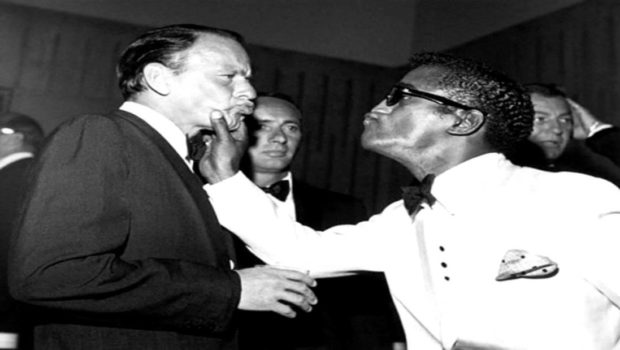
FRIDAYS ARE FOR FRANK: “Me & My Shadow” (feat. Sammy Davis, Jr.)
We say this a lot about Frank Sinatra—he was a complicated guy.
His Hoboken upbringing gave him a bit of an edge, which tended to manifest itself in well-documented outbursts and vindictive, destructive behavior. But living in this community also taught him life-altering lessons on diversity, acceptance and empathy.
All of this helped shape Sinatra’s policies for recording and on tour—oftentimes forcing previously unseen flexibility in the venues where he would perform.
“He began to insist that the orchestras that backed him on his best-selling record albums were integrated. He did the same with the orchestras that backed him on his live concert tours. While this may not seem like a big deal today, it was an important step,” writes author Barry Bradford. “On one level, he provided employment for excellent musicians, regardless of color. This opened the door to better pay and treatment for many black entertainers. However, it also sent a clear message to his audiences. Prejudice and racism had no place at a Frank Sinatra concert. His biographers note that he was adamant that black entertainers be treated well and that the members of his band be treated equally, regardless of race.”
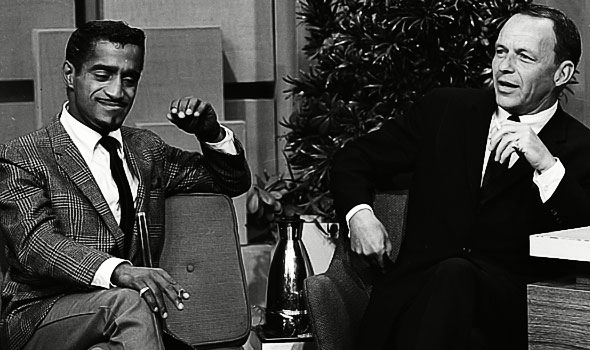
Frank’s steadfast support of the Civil Rights movement was often seen as a stark contrast to his legendary demeanor. He may have disliked a lot of people, but it was never out of some archaic prejudice. If Frank didn’t like you, it was for a reason.
“Sinatra could be a complete horse’s ass. He was often mean-spirited, vengeful, and harsh in his treatment of other people,” according to Bradford. “However, his judgments never had to do with race. Again, black musicians who played for Sinatra uniformly praised him for the ways in which they were respected.”
Frank’s deep and meaningful friendship with Sammy Davis, Jr. did a lot to knock down the walls that separated black talent from white audiences.
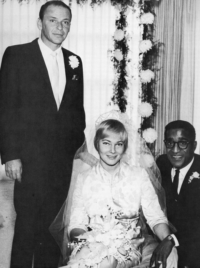 “In the days when Las Vegas began to become popular, the black performers could play in showrooms, but they couldn’t stay in the hotel. And it was Frank Sinatra who went to the board of directors, who had rather shady pasts, and he said, ‘Are you guys going to come into the twentieth century, or aren’t you?,'” recalled Frank Sinatra, Jr. in a CBC interview, before his 2016 passing. “Somebody said ‘Well, we have white people, we have black people.’ Sinatra, the story goes, said to them, ‘The money is green. How about that?’ And they began to look at each other and the wheels were turning, and because of Sammy, Las Vegas became integrated.”
“In the days when Las Vegas began to become popular, the black performers could play in showrooms, but they couldn’t stay in the hotel. And it was Frank Sinatra who went to the board of directors, who had rather shady pasts, and he said, ‘Are you guys going to come into the twentieth century, or aren’t you?,'” recalled Frank Sinatra, Jr. in a CBC interview, before his 2016 passing. “Somebody said ‘Well, we have white people, we have black people.’ Sinatra, the story goes, said to them, ‘The money is green. How about that?’ And they began to look at each other and the wheels were turning, and because of Sammy, Las Vegas became integrated.”
Sammy Davis, Jr. walked headlong into the fray that is the racial divide. On the golf course one day, Jack Benny asked him about his handicap. “Handicap?” Davis responded. “Talk about handicap — I’m a one-eyed Negro Jew.”
Davis continually faced racism, and much of the money he made as an entertainer was channeled into financial support for the civil rights movement.
In 1960, Davis married Swedish actress May Britt. At that time, interracial marriages were exceptionally rare—in fact, they were illegal in 31 states. The relationship prompted an outpouring of hate mail as he starred in the Broadway musical adaptation of “Golden Boy.” Undeterred, Davis went on with the show, receiving a Tony Award nomination for best actor.
Here’s Sammy and his shadow, Frank, doing what they do best—standing together on the same stage and bringing joy to people…

 Previous Article
Previous Article Next Article
Next Article September 11, 2001 — the Hoboken Community Remembers
September 11, 2001 — the Hoboken Community Remembers 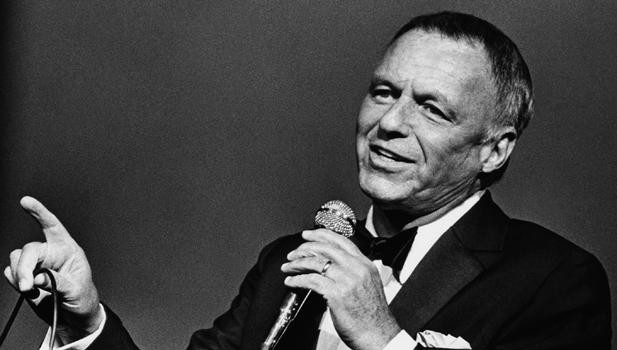 FRIDAYS ARE FOR FRANK: “New York, New York”
FRIDAYS ARE FOR FRANK: “New York, New York”  HOBOKEN NINE CELEBRATE 172 YEARS OF ‘BASE BALL’: Saturday, June 16th at Stevens
HOBOKEN NINE CELEBRATE 172 YEARS OF ‘BASE BALL’: Saturday, June 16th at Stevens  HOBOKEN ITALIAN FESTIVAL 2019: Feast of the Madonna Dei Martiri, September 5-8
HOBOKEN ITALIAN FESTIVAL 2019: Feast of the Madonna Dei Martiri, September 5-8  FRIDAYS ARE FOR FRANK: “I Wish You Love” (feat. the Count Basie Orchestra)
FRIDAYS ARE FOR FRANK: “I Wish You Love” (feat. the Count Basie Orchestra)  FRIDAYS ARE FOR FRANK: “What Now My Love” (feat. Aretha Franklin)
FRIDAYS ARE FOR FRANK: “What Now My Love” (feat. Aretha Franklin) 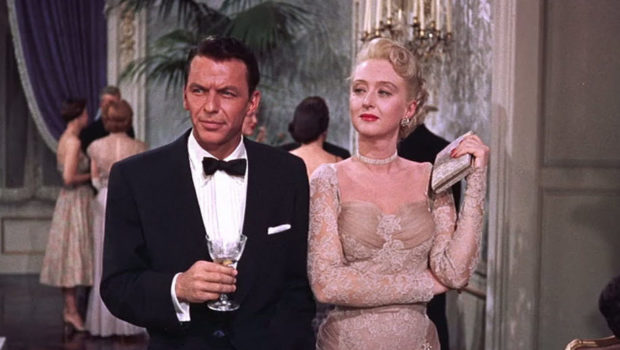 FRIDAYS ARE FOR FRANK: “I Get A Kick Out Of You”
FRIDAYS ARE FOR FRANK: “I Get A Kick Out Of You”  FRIDAYS ARE FOR FRANK: “On A Clear Day (You Can See Forever)”
FRIDAYS ARE FOR FRANK: “On A Clear Day (You Can See Forever)”